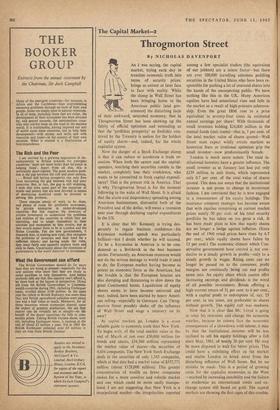The Capital Market-2
Throgmorton Street
By NICHOLAS DAVENPORT Now the danger of a Stock Exchange slump is that it can induce or accelerate a trade re- cession. When both the savers and the capital- spenders, watching their securities tumble in the market, completely lose their confidence, who wants to be committed to fresh capital expendi- tures? That is the present risk in America. That is why Throgmorton Street is for the moment following in the wake of Wall Street. It is afraid that the alarm and despondency spreading among American businessmen, distrustful both of the Presiant and of the dollar, will mean a recession next year through declining capital expenditures in the US.
It is clear that Mr. Kennedy is trying des- perately to regain business confidence—his Keynesian weekend speech was particularly brilliant—but I doubt whether he will succeed. To be a Keynesian in America is to be con- demned as a Bolshevik in the best business circles. Fortunately, an American recession would not do the serious damage to world trade it used to do, the European market having become as potent an economic force as the American, but the trouble is that the European bourses are also slumping and threatening to slow down the great Continental boom. Liquidation of equity shares seems to have become universal and may, indeed, have been started by heavy Ameri- can selling—especially in Germany. Can Throg- morton Street possibly shake off the influence of Wall Street and stage a recovery on its own?
As capital markets go, London is a more reliable guide to economic truth than New York. To begin with, of the total market value at the end of March of just over £50,000 million for bonds and shares, £34,360 million represented the market value of shares—the securities of 4,434 companies. The New York Stock Exchange deals in the securities of only 1,543 companies, which at that date had a market value of $357,771 million (about £128,000 million). This greater concentration of wealth on fewer companies makes for a more sensitive and volatile market and one which could be more easily manipu- lated. I am not suggesting that New York is a manipulated market—the irregularities reported among a few specialist traders (the equivalent of our jobbers) are a minor factor—but there are over 100,000 travelling salesmen peddling securities in the United States who have been re- sponsible for pushing a lot of unsound shares into the hands of the unsuspecting public. We have nothing like this in the UK. Many American equities have had sensational rises and falls in the market as a result of high-pressure salesman- ship. Even the great IBM rose to a price equivalent to seventy-four times its estimated annual earnings per share! With thousands of small investors holding $24,000 million in the mutual funds (unit trusts)—that is, 7 per cent. of the total market value of shares quoted—Wall Street must expect wildly erratic markets as hysterical fears or irrational optimism grip the small investor—now predominantly female.
London is much more sedate. The staid in- stitutional investors have a greater influence. The small investor as at January last had put only £239 million in unit trusts, which represented only 0.7 per cent. of the total value of shares quoted. This does not mean that the institutional investor is not prone to change in investment fashion. I am convinced that he is now engaged in a reassessment of his equity holdings. The insurance company manager has become aware that with equities comprising at current market prices nearly 50 per cent. of his total security portfolio he has taken on too great a risk. It has been made plain to him that equity shares are no longer a hedge against inflation. (Since the end of 1960 retail prices have risen by 6.7 per cent., while equity shares have fallen by 13 per cent.) The economic climate which Con- servative governments have created is not con- ducive to a steady growth in profits—only to a steady growth in wages. Rising . costs can no longer be passed on to the consumer, profit margins are continually being cut and profits eaten into. An equity share which cannot offer increasing earnings and dividends is the worst of all possible investments. Bonds offering a high current return of 51 per cent. to 6 per cent., with a capital profit to redemption of, say, 25 per cent. in ten years, are preferable to shares without growth. The equity cult was madness.
Now that it is clear that Mr. Lloyd is going to relax his restraints and change the economic weather, because he cannot face the economic consequences of a showdown with labour, it may be that the institutional investor will be less inclined to sell his equity holdings after a fall since May, 1961, of nearly 30 per cent. He may be more disposed to wait for better prices. This could have a stabilising effect on the market and enable London to break away from the disturbing influence of Wall Street. But let no mistake be made. This is a period of growing crisis for the capitalist economies in the West —marked by increasing instability and the failure to modernise an international credit and -ex- change system still based on gold. The capital markets are showing the first signs of this trouble.


































 Previous page
Previous page